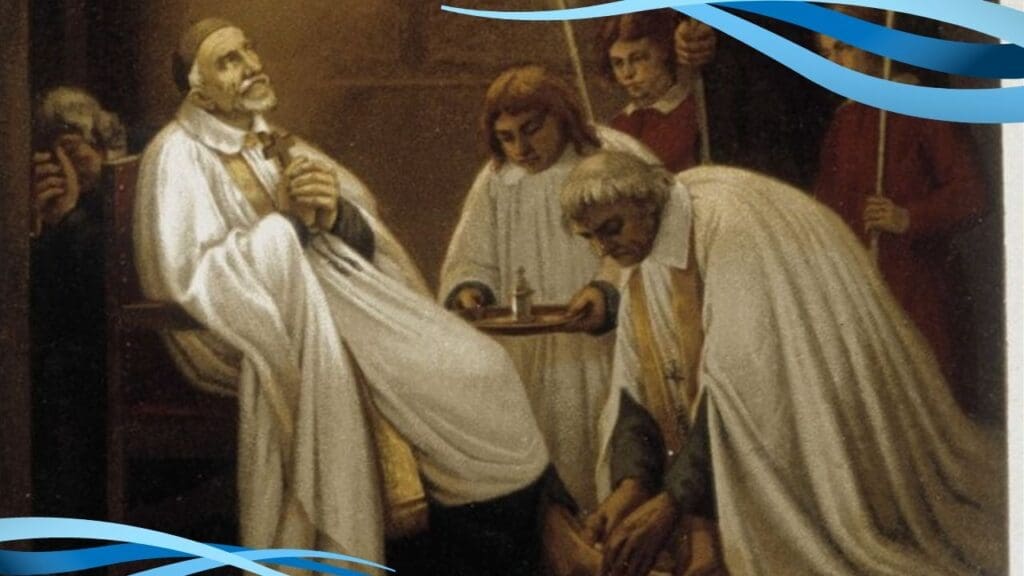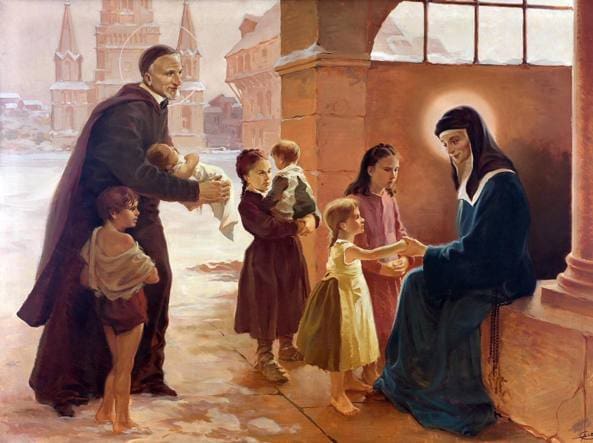Today we celebrate, full of joy, our founder St Vincent de Paul who taught us how to clothe ourselves with Jesus Christ! In this article, our confrere accompanies us as we reflect on the last days of Monsieur Vincent, on the threshold of his fourth centenary.

At the dawn of 27 September 1660, Monsieur Vincent, full of years and merits, ended his missionary journey. It is interesting to know the chronicle of the end of his days, left to us as an invaluable treasure by Father Gicquel, who narrates how our Saint, surrounded by his children and at the request of Father Dehorgny, in his final moments blessed the associations and works that came from his heart. Dehorgny, in his final moments blessed the associations and works that came from his heart: the Priests and Brothers of the Congregation of the Mission, the Daughters of Charity, the Ladies of Charity, the Tuesday conferences, the orphaned children, the elderly, benefactors and friends… And after having invoked “Jesus” evangeliser of the poor, whom he loved so much, he arrived at the gates of Paradise.
If we follow the thought of the Danish philosopher Soren Kierkegaard, who coined the term “instant” which “is the momentary act of man’s intuition which, rising above the temporal succession of acts and events, grasps at once the unitary meaning of the whole of life, the deepest motivations of all of them in their intentional unity, and penetrates through a sense-knowledge into his true being: what he has desired and made of himself in the course of time, the result of his freedom. When such an intuition is provoked by the action of God, it is the irruption of eternity into time, the tangency of the eternal into the historical, the descent of the Infinite into existence and the elevation of the latter into the former in one decisive stroke, cast from the depths of an authentic “present”; Santiago Arzubialde, s.j; I dare to reflect by saying that Mr Vincent, on meeting Jesus, in his last “instant”, had two facets: to contemplate the past and the present, both his own and that of his children, and also the future of the work that came from his hands.
First facet:
He must have seen how the Lord changed his course like Paul in Damascus, for his existence was no longer “an honourable retreat” but an encounter with him in the person of the least, the poor and the abandoned of the State and the Church. And in order to bring this work to completion, he opened up multicoloured horizons and, in the case that interests us today, the “little Company of the Mission”. This work, like all his, is not the result of an exaggerated narcissism which he wanted to prolong over time, but a gift of God to the Church, and therefore his project was not ephemeral, nor did it end with him. This is how he expressed it to us:
“I never thought about it. God has done it all. We men have had no part in it…everything I see seems to me to be a dream. All this is not human but God’s!” SVP. XI, 326.
The Congregation, being true, placed its talents to fulfil the Lord’s designs, doing everything and suffering for the glory of God and the edification of his Church. SVP.VII, 438.
And with an element very close to his heart: Divine Providence, he left our course for us:
“The true missionary does not have to worry about the goods of this world, but puts all his trust in the providence of the Lord, certain that, as long as he remains in charity and relies on this trust, he will always be under the protection of God; consequently, nothing bad will happen to him, nor will he lack any good, even if he thinks that, according to what appears, everything is about to fail….You must hope that, as long as you remain firm in this confidence, you will not only be free from all evils and all annoying accidents, but you will be filled with all kinds of good things…”. SVP. XI, 4. P. 731
Good Vincent walked with his squire Portail and the missionaries who were always with him until the end of his life. He died with the serenity of having fulfilled God’s will, he and his faithful missionaries. He was never discouraged by the desertions of his disciples, nor by the persecutions they suffered, and even less so by the premature death of some of them… as the apostle of Tarsus could exclaim: “I have fought my battle well, I have run to the goal, I have kept the faith. Now there awaits me the crown I deserve, with which the Lord, the righteous judge, will reward me on that day; and not only me, but all who have love at his coming. Tim. 4, 8. He reached the goal, to be followed by Almerás, Gilguel, Dehorny… And with them, the journey of the Society continued.

Second facet:
And the fledgling but solid Society continued to sail through the backwaters of missionary life, sometimes in the turbulence and persecutions in France, China, Spain… even in the most unsuspected corners of the world. Some were unfaithful or rather weak in their vocation, like the refractory bishops of the French Revolution, or Sapetus the expeditionary of Abyssinia… but yesterday, young men like Monsignor Delaplace, who, as a seminarian at the Mother House, in his youthful effervescence, one day jumped down the stairs and when he met the Superior General, Fr. Etienne, who saw him with a grim look on his face, our future missionary bishop said to him: “Isn’t it true Father, that one day I will go to China and climb mountains and cross rivers? And there he did indeed go and die”, or Fathers Bernardos, Drug and Koch, who left the comforts of their native Germany, and spent themselves to the bone in the jungle of Costa Rica.
St. Vincent continues with his worn-out shoes next to his missionaries: “Look, we can think of ourselves as the fathers. The Company is still in the cradle; it has only just been born; it has only been born for twenty-five or thirty years. What does this mean, is it not still in the cradle? And those who come after us, three or four centuries from now, will look upon us as fathers…it will be said of those who are now in this company: “In the time of the first priests of the Mission this was done; they behaved like this; such and such virtues were in force”, and so on in everything else. If this is so, my brothers, what example are we to leave to our successors, to our children, since the good that they do depends in a certain way on the good that we do…?Oh, Fathers, what a consolation and what a joy we will have when God wants to make us see the good that the company does, producing an abundant harvest of good works, observing the rules with fidelity and exactitude, practising the virtues that make up its spirit, following the good examples that we have given them… Well, let us place ourselves heartily in the hands of God; let us work, let us work, let us go and help the poor people of the countryside who are waiting for us…”. Repetition of the prayer of 25 November 1657. SVP. XI, 3. 315.
Truly, today we look with grateful remembrance at the witness of the Founder and of hundreds of sons of Paul, who did not shirk their efforts, and who to us workers of the present hour give us this glorious legacy of their lives. The missionaries of the dawn, and those who arrived in the heat of the day, give us a message, like that which the Council Fathers of Vatican II addressed to humanity on 7 December 1965. Let us appropriate the exhortation to young people: “…For it is you who will receive the torch from the hands of your elders and live in the world at a time of the most gigantic transformations in its history. It is you who, gathering the best of the example and teachings of your parents and your teachers, will form the society of tomorrow; you will be saved or perish with it”.
We already have in our hands “the torch of our elders”, what a responsibility! The Congregation of the Mission in the present and in the future, after Providence, depends on us, we will save it or perish with it. Let us listen to what the Founder said to the missionaries of yesterday and also to those of today:
“Look, my Fathers and Brothers, we must have within us this disposition, and even this desire, to suffer for God and for our neighbour, to consume ourselves for them. Oh, how fortunate are those to whom God gives these dispositions and desires! Yes, Fathers, we must put ourselves totally at the service of God and at the service of the people; to consume ourselves for this, to give our lives for this, to strip ourselves, so to speak, in order to clothe ourselves anew; at least, to want to be in this disposition, if we are not already in it; to be willing and ready to go and go where God wills, whether to the Indies or elsewhere; in a word, to expose ourselves willingly in the service of our neighbour, in order to extend the rule of Jesus Christ in souls. I myself, although I am old and aged, do not cease to have this disposition within me, and I am even ready to go to the Indies, to win souls for God there, even if I have to die on the way or on the ship”. SVP. XI, 281.
Today we, the children of the “giant of charity”, are in more than 160 countries all over the world, and among them, we missionaries of the Congregation of the Mission have passed the hundred mark. How insistently our present Superior General, Fr. Mavric, has insisted that we go into those countries, and indeed poor countries where we are not, to bring the good news of salvation to the ends of the earth….
How happy is the condition of a missionary who has no other limits in his missions than the habitable world! Why then restrict ourselves to a point and set limits within a parish, if the whole circumference of the circle is ours? SVP X1,828-829.
Now Lord Vincent will remember that the Lord’s promises, in the final “instant” of his agony, are a reality today 364 years after his earthly termination. The Lord as to Moses will now again say to him: “Lift up now thine eyes, and look from the place where thou standest toward the north, and toward the south, and toward the east, and toward the west. For all the land which you see I will give to you and to your descendants forever”. Genesis 13,14 – 16
In holy humility, and with our Holy Founder, let us say to the Good Lord:
O Saviour, my good Saviour, may your divine goodness rid the Mission of this spirit of idleness, of seeking comfort, and give it an ardent zeal for your glory, which will make it embrace everything with joy, never refusing the occasion to serve you! We are made for this; to a missionary, a true missionary, a man of God, a man who has the spirit of God, everything must seem good and indifferent; he embraces everything, he can do everything; a fortiori a company: a congregation can do everything when it is animated and carried by the spirit of God. SVP. XI 121-122.

